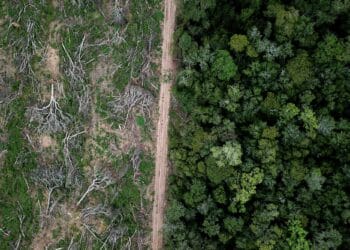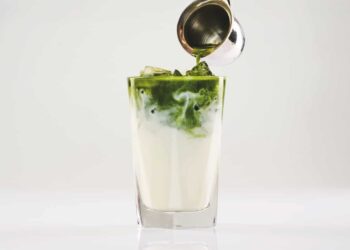One Brazilian startup has found a way to repurpose coffee husk into chocolate, addressing key sustainability concerns across both supply chains.
As sustainability across the coffee supply chain is increasingly put under the microscope, many companies are finding ways to shift to a more circular economy. The journey from bean to cup is known to have a relatively high carbon footprint.
Similarly, chocolate production generates significantly more emissions than most other fruit and vegetables. And now, as both commodities reach record high prices, Brazilian startup Cellva is attempting to address both sustainability and supply issues by taking advantage of the fact coffee and chocolate undergo similar processes that contribute to their flavour profiles.
The result is CoffeeCoa, which is said to deliver the sensory experience of cocoa with added functional benefits, making it a versatile ingredient for baked goods, beverages, and functional foods. To produce the product, the company is tapping into a valuable resource that has been largely overlooked – coffee husk waste.
Coffee production generates an immense amount of waste, with approximately 10 million tons of coffee beans produced annually. This is accompanied by an estimated one to one and a half times that amount in by products, such as husks, pulp, and grounds.
“If CoffeeCoa captures just one per cent of global coffee husk waste, it could repurpose more than 100,000 tons annually, diverting it from landfills and reducing methane emissions,” says Cellva CEO Sérgio Pinto.
“Beyond waste reduction, this also offers manufacturers a cost-effective alternative to cocoa – 30 per cent cheaper on average – while ensuring stability amid the volatility of cocoa prices driven by climate change and supply chain disruptions.”
What’s more, Pinto says CoffeeCoa requires up to 90 per cent less land compared to conventional cocoa, cutting deforestation risks and preserving approximately 1800 hectares of tropical forest annually. It is also said to reduce water consumption by more than 70 per cent, saving approximately 56 billion litres per year, which is the equivalent of the annual water use of 500,000 people.
“Additionally, CoffeeCoa lowers carbon dioxide emissions by at least 50 per cent, preventing the release of 7500 tons of carbon dioxide per year, which is comparable to removing 1600 cars from the roads,” says Pinto.
Since coffee and cocoa have intrinsically similar flavour notes and characteristics, Cellva’s engineering aims to isolate these compounds and insert them into chocolate formulations.
“We ensure CoffeeCoa closely resembles traditional cocoa, leveraging its naturally sweet flavour profile by blending with its caramelised notes and maintaining its rich composition of antioxidants and fibre. This also offers health benefits such as improved digestion, increased satiety, and better metabolic health,” says Pinto.

Although the technology is in the pre-launch phase, Pinto says it has garnered significant commercial interest – securing more than US$5 million in committed interest contracts, with partners indicating a demand exceeding 450 tons per year – with much of this attention coming from the premium coffee and high-end confectionery sectors as well as global distributors.
“To meet this demand, we are in the final stages of establishing a manufacturing facility in Bahia, Brazil, in collaboration with an extremely experienced operator. Additionally, we are refining distribution agreements across Latin America and Australia to ensure broad market access,” says Pinto.
He says the commercial partners were drawn to CoffeeCoa’s unique sensory profile and sustainable value proposition.
“One is a leading Brazilian coffee brand exploring the addition of CoffeeCoa as a signature ingredient in specialty blends. The other is an Australian distributor developing a new line of artisanal baked goods, where CoffeeCoa will serve as a distinctive flavour element,” says Pinto.
Beyond its environmental benefits, CoffeeCoa is said to be a health-positive alternative to traditional chocolate.
“CoffeeCoa provides a lower-fat alternative while still delivering potent antioxidant and anti-inflammatory properties. Additionally, its high dietary fibre content offers potential gut-health benefits, making it a functional ingredient that not only mimics cocoa’s sensory qualities but also provides distinct nutritional advantages,” says Pinto.
While both cocoa and CoffeeCoa are said to be rich in antioxidants and anti-inflammatory compounds, Pinto says the latter contains chlorogenic acids, trigonelline, and polyphenols, which are known for their metabolic benefits, supporting heart health, cognitive function, and gut microbiome balance.
Pinto expects Europe to emerge as a key market, especially countries with a strong specialty chocolate and bakery scene, where ‘clean-label’ alternative ingredients are in high demand.
“We also see growing interest in the Asia-Pacific – especially in Japan and South Korea – where there’s a cultural openness to novel food experiences and functional ingredients,” says Pinto.
“Notably, we’ve already secured a commercial relationship in Australia, a market known for its advanced food innovation landscape and appetite for sustainable sourcing.”
CoffeeCoa’s first commercial delivery is expected to take place by mid-2025.
This article was first published in the May/June 2025 edition of Global Coffee Report. Read more HERE.





